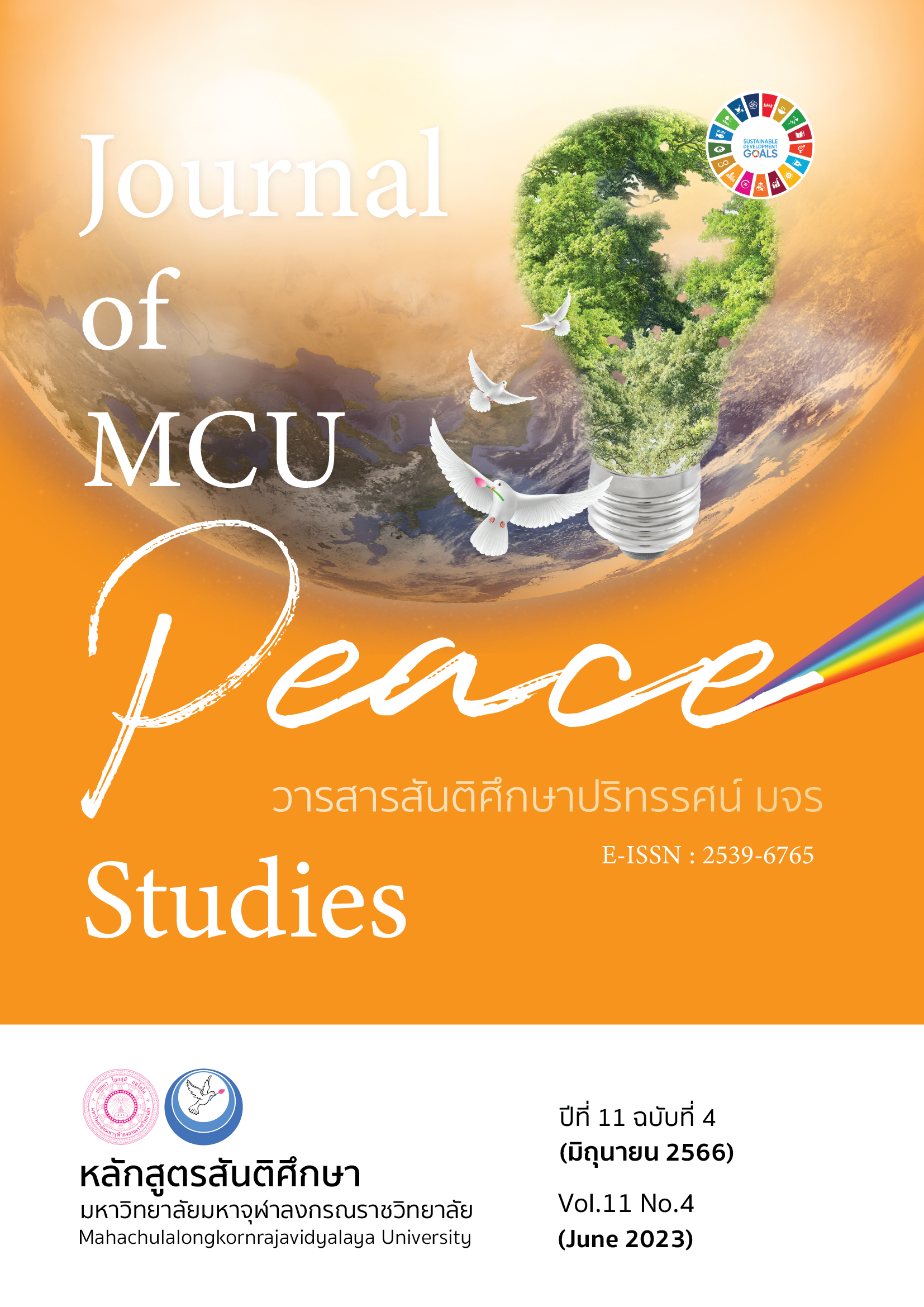การพัฒนาองค์ประกอบภาวะผู้นำการเปลี่ยนแปลงของผู้อำนวยการกองการศึกษา ศาสนา และวัฒนธรรม สังกัดองค์กรปกครองส่วนท้องถิ่น กระทรวงมหาดไทย
Main Article Content
บทคัดย่อ
บทความวิจัยนี้ มีวัตถุประสงค์ 1) เพื่อพัฒนาองค์ประกอบ 2) เพื่อศึกษาความเป็นไปได้ในทางปฏิบัติขององค์ประกอบ และ 3) เพื่อศึกษาจุดเด่น และจุดที่ควรพัฒนาการพัฒนาองค์ประกอบภาวะผู้นำการเปลี่ยนแปลงของผู้อำนวยการกองการศึกษา ศาสนา และวัฒนธรรม สังกัดองค์กรปกครองส่วนท้องถิ่น กระทรวงมหาดไทย เป็นการวิจัยเชิงพรรณนา กลุ่มตัวอย่าง คือ ผู้อำนวยการกองการศึกษา ศาสนา และวัฒนธรรม สังกัดองค์ปกครองส่วนท้องถิ่น กระทรวงมหาดไทย เขตภาคกลาง จำนวน 312 คน เครื่องมือที่ใช้ในการเก็บรวบรวมข้อมูลเป็นแบบสอบถามทำการวิเคราะห์ข้อมูลโดย การวิเคราะห์ข้อมูลโดยใช้สถิติบรรยาย ได้แก่ ความถี่ ร้อยละ ค่าเฉลี่ย ค่าเบี่ยงเบนมาตรฐาน ค่าความเบ้ ค่าความโด่ง (Kurtosis) ค่า Kolmogorov และการวิเคราะห์องค์ประกอบเชิงยืนยัน
ผลการวิจัยพบว่า 1) การพัฒนาองค์ประกอบภาวะผู้นำการเปลี่ยนแปลงของผู้อำนวยการกองการศึกษา ศาสนา และวัฒนธรรม สังกัดองค์กรปกครองส่วนท้องถิ่น กระทรวงมหาดไทย มีทั้งสิ้น 6 องค์ประกอบ คือ 1. วิสัยทัศน์ของการเปลี่ยนแปลง 2. การสร้างทีมงานที่มีประสิทธิภาพ 3. ความมุ่งมั่น 4. ทักษะด้านมนุษย์สัมพันธ์ 5. การประเมินผล 6. การสร้างพันธมิตร 2) ผู้อำนวยการกองการศึกษา ศาสนา และวัฒนธรรม ในจังหวัดภาคกลาง มีความเห็นว่าทุกองค์ประกอบของภาวะผู้นำการเปลี่ยนแปลง มีความเป็นไปได้ ในระดับมาก - มากที่สุด ในทางปฏิบัติร้อยละ 80 และตัวแปรภาวะผู้นำการเปลี่ยนแปลงของผู้อำนวยการกองการศึกษา ศาสนา และวัฒนธรรมที่ผู้วิจัยพัฒนามีความสอดคล้องกลมกลืนกับข้อมูลเชิงประจักษ์ พิจารณาได้จากค่าไค-สแควร์ที่แตกต่างจากศูนย์อย่างไม่มีนัยสำคัญทางสถิติ (Chi-square = 10.293; df = 8, p = .245) 3) ภาวะผู้นำการเปลี่ยนแปลงของผู้อำนวยการกองการศึกษา ศาสนา และวัฒนธรรม สังกัดองค์กรปกครองส่วนท้องถิ่น กระทรวงมหาดไทย จุดเด่น คือ องค์ประกอบที่ 1 วิสัยทัศน์ของการเปลี่ยนแปลง ( = 4.303, S.D. = .350) มีค่าเฉลี่ยมากที่สุด จุดที่ควรพัฒนา คือ องค์ประกอบที่ 3 ความมุ่งมั่น (
= 3.994, S.D.= .391) ค่าเฉลี่ยต่ำสุด
Article Details

อนุญาตภายใต้เงื่อนไข Creative Commons Attribution-NonCommercial-NoDerivatives 4.0 International License.
ทัศนะและความคิดเห็นที่ปรากฏในบทความในวารสาร ถือเป็นความรับผิดชอบของผู้เขียนบทความนั้น และไม่ถือเป็นทัศนะและความรับผิดชอบของกองบรรณาธิการ ยินยอมว่าบทความเป็นลิขสิทธิ์ของวารสาร
เอกสารอ้างอิง
Benis, W., & Nanus, B. (1985). Leader: Strategies for Taking Change. New York: The Force Press.
Boonveerabut, S. (1998). Sport Psychology. (1st ed.). Chonburi: Chonburiindex.
Center for Creative Leadership. (n.d.). How to Be a Successful Change Leader. Retrieved October 31, 2019, from https://www.ccl.org/articles/leading-effectively-articles/successful-change-leader/
Department of Local Administration. (2019). Information on the Number of Local Government Organizations. Retrieved December 12, 2019, from http://www.dla.go.th/work/abt/index.jsp2562
Hoy, W. K., & Miskel, C. G. (2008). Educational Administration: Theory, Research and Practice. (8th ed.). New York: McGraw-Hill.
Jarernsuk, N. (2015). The Effective Leadership Factors for Administrators of Faculty of Education of Rajabhat University. Phuket Rajabhat University Academic Journal, 11(2), 81-101.
Kajornsin, B. (2010). Educational Research Methodology. (5th ed.). Bangkok: P. N. Printing.
Kapthong, K. (2009). The Development of Mathematics Process in Addition, Substation, Mulitiple and Fraction Division Using Activities Program with CIPPA Model for Students in Pratomsuksa 6, Office of Surin Educational Service Area 1. (Master’s Thesis). Surindra Rajabhat University. Surin.
Kotter, J. (1982). The General Managers. (1st ed.). America: The Free Press.
Kouzes, J. M., & Posner, B. Z. (2007). The Leadership Challenge. (4th ed.). San Francisco, CA: Jossey-Bass.
Meepan, N. (2016). The Leadership Model of Administrators Awarded Royal Awards for Secondary Education Level in the upper Northern Region, Thailand. (Doctoral Dissertation). Chiang Mai Rajabhat University. Chiang Mai.
Noparat, N. (2018). Leadership in Change. Retrieved December 12, 2019, from https://acrosswork.co.th/2018/10/
Office of the National Economic and Social Development Council. (2016). The Eleventh National Economic and Social Development Plan (2012-2016). Retrieved December 12, 2019, from https://drive.google.com/file/d/1VXj7xULoiyzJsNIOHo3zbkFNG5dntc0V/view
Pongsriwat, S. (2002). Leadership In the Theory and Practice of Science and Art to Complete Leadership. (2nd ed.). Bangjkok: Wirat Education Co., Ltd.
Pongsuwan, Ch. (2005). The Relationship between Transformational Leadership and Academic Decentralization of Basic Schools Ampor Pak Tho Ratchaburi Educational Service Area Office 1. (Master’s Thesis). Graduate School: Srinakharinwirot University. Nakhon Pathom.
Ruyaporn, K. (2011). Leading Change. Retrieved December 12, 2019, from http://www.e-apic. com/news_detail.php?id=116
Satthachatmongkol, N., & Thamphaiboon, A. (2016). Transformational Leadership in Globalization towards Sustainable Development. Business Review, 8(1), 167-182.
Secretariat Office of the Teachers’ Council of Thailand. (2005). Educational Professional Standards. Bangkok: Printing House Teachers Council of Ladprao.
Srichaingam, T. (2013). A Development of Transformational Leadership Model of School Administrators Under the Secondary Educational Service Area Offices 1 and 2. (Doctoral Dissertation). Sripatum University. Bangkok.


